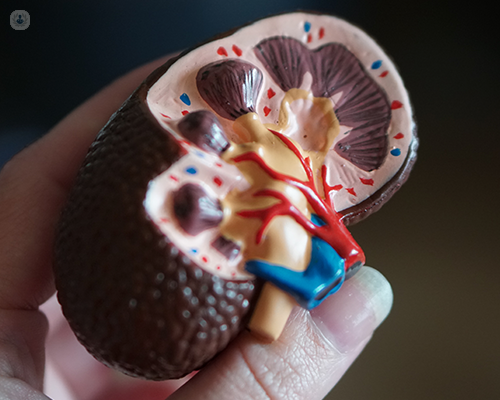Kidney stones: How they are diagnosed and treated
Escrito por:Kidney stones, while often harmless, can be painful, uncomfortable and problematic. When this happens, you’ll likely feel pain among other symptoms (see Mr Syed’s article Kidney stones: what are they and what are the symptoms?). You'll require medical help to confirm a diagnosis and, if necessary, non-surgical or surgical treatment. Mr Haider Syed, a consultant urologist and specialist in the treatment and removal of kidney stones, provides you with what you can expect.

What tests can patients expect?
If you’re experiencing the symptoms of kidney stones and need to undergo testing, your examination is likely to include at least one or several the following:
Computerised Tomography (CT scan)
A CT scan is one of the most helpful methods for diagnosing kidney stones. With a CT scan, we can discover the size and position of a kidney stone, as well as how many you have and the level of obstruction that it’s causing. The scan does involve a small dose of radiation, but this is safe for the majority of patients.
With all this information, we can plan further management of your condition and decide the best course of action for treating your kidney stone(s).
Ultrasound scan
An ultrasound scan, just like a CT scan, can detect kidney stones. However, an ultrasound may miss some smaller stones in the kidney or ureter.
The benefit is that during an ultrasound, patients aren’t exposed to radiation, making it suitable for children, young women or pregnant women.
Plain X-Ray (KUB)
A plain x-ray is a basic imaging technique and it helps to identify the kidney stone and assists with following up patients’ progress after treatment.
Urine and blood tests
To determine your diagnosis, you might need to undergo baseline urine tests to rule out any infection. You might also require a urea and electrolyte blood test to define your kidney function as well as calcium and uric acid levels (the substances that can cause a kidney stone). A blood test can check your white cell count, which, if raised, signals an infection.
When is best to seek medical help?
If you suddenly develop a severe flank pain that radiates to the grown, along with nausea, vomiting and high temperature, go to your nearest accident and emergency department as soon as possible.
You’ll then be assessed and given pain relief in the form of an injection, tablet or rectal suppository. You’ll then undergo the tests that were previously mentioned: urine test, blood test and imaging tests to rule out obstructions caused by the kidney stones.
What treatment is offered for small stones?
If the stone is 4mm or less and your urine and blood results are normal, the stone is likely able to flow out the body naturally with urine. In these cases, treatment is mainly conservative (non-surgical) and for relief. You might be sent home with oral pain relief medication and have a follow-up scheduled in a clinic to review if your condition has been resolved.
What treatment is offered for large stones?
If the stone is bigger than 5mm and has led to the obstruction of your kidney, you’ll be admitted to hospital. Depending on your condition, you will have the obstruction treated urgently or you’ll be booked in for an elective procedure.
The majority of small stones within the kidney are fragmented by lithotripsy (shock wave therapy). Read Mr Syed’s in-depth explanation of lithotripsy from initial consultation to the procedure, aftercare and follow up checks).
However, a proportion of smaller stones and most larger stones need other treatment methods using telescopes passed through the bladder or through a keyhole operation. You may be offered laser surgery, cystoscopy or a ureteroscopy.
Which treatment is best?
To know which procedure is best for you, you’ll need personalised guidance from your urologist. The decision of which procedure is best for you is taken based on the size of your stone, its position and the structure of your kidney.
Mr Haider Syed has spent many years providing patients with solutions to their kidney stones – visit his profile to get in touch and learn how he can help you.


